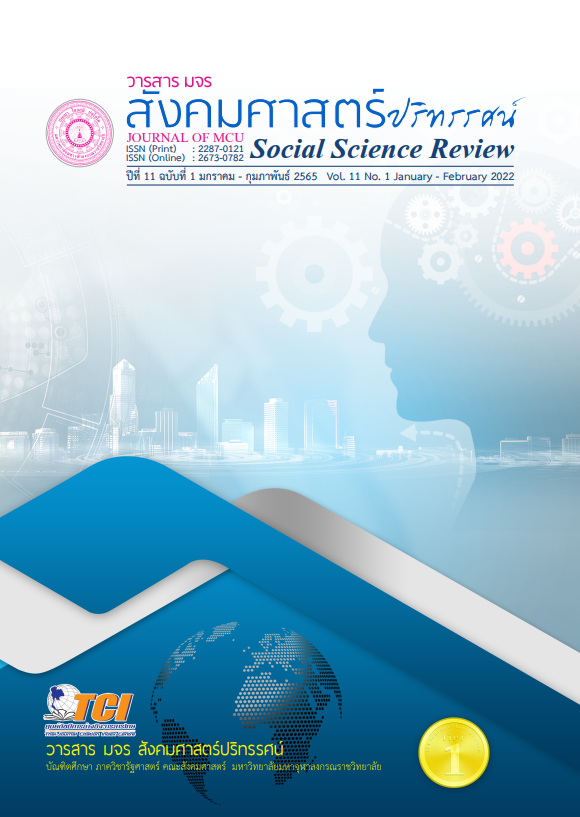การใช้ข้อมูลบัญชีบริหารเพื่อความยั่งยืนขององค์กร: การวิจัยเชิงประจักษ์ของธุรกิจไฟฟ้าและอิเล็กทรอนิกส์ ในประเทศไทย
คำสำคัญ:
การใช้ข้อมูลบัญชีบริหาร, ความยั่งยืนขององค์กร, ธุรกิจไฟฟ้าและอิเล็กทรอนิกส์บทคัดย่อ
งานวิจัยนี้มีวัตถุประสงค์เพื่อทดสอบผลกระทบและความสัมพันธ์ของการใช้ข้อมูลบัญชีบริหารที่มีต่อความยั่งยืนขององค์กร ประยุกต์ใช้มุมมองแนวคิดตามทฤษฎีความได้เปรียบเชิงทรัพยากร โดยใช้แบบสอบถามเป็นเครื่องมือในการเก็บรวบรวมข้อมูลจากหัวหน้างานฝ่ายบัญชีของธุรกิจไฟฟ้าและอิเล็กทรอนิกส์ในประเทศไทย จำนวน 210 คน การวิเคราะห์ข้อมูลและการทดสอบสมมติฐานการวิจัยใช้สถิติการถดถอยพหุคูณ ด้วยวิธีกำลังสองน้อยที่สุดธรรมดา (Ordinary Least Squares: OLS)
ผลการวิจัยพบว่า การใช้ข้อมูลบัญชีบริหารมีผลกระทบและความสัมพันธ์เชิงบวกอย่างมีนัยสำคัญต่อความยั่งยืนขององค์กร วัตถุประสงค์หลักของการบัญชีบริหารคือการให้ข้อมูลแก่ผู้บริหารเพื่อใช้ในการวางแผน การควบคุม การประเมินผลการปฏิบัติงาน และการตัดสินใจเชิงกลยุทธ์ที่มีประสิทธิภาพ ดังนั้น การใช้ข้อมูลบัญชีบริหารที่เหมาะสมจึงเสมือนเป็นเครื่องมือที่สำคัญที่สุดของผู้บริหารในการขับเคลื่อนองค์กรไปสู่ความสำเร็จของการดำเนินงานในระยะยาว และช่วยให้บริษัทสามารถอยู่รอดได้อย่างยั่งยืนภายใต้แรงกดดันจากสภาพแวดล้อมทางธุรกิจที่เปลี่ยนแปลงไปอย่างรวดเร็ว
เอกสารอ้างอิง
Alsulmani, A. H., et al. (2021). Customer Accounting Information and Omani Service Companies’ Performance. International Journal of Finance & Banking Studies (2147-4486), 10(2), 79-88.
Armstrong, J. S. & Overton, T. S. (1977). Estimating Nonresponse Bias in Mail Surveys. Journal of Marketing Research, 14(3), 396-402.
Bank of Thailand. (2020). Monetary policy report 2020. Retrieved November 11, 2020, from https://www.bot.or.th/Thai/PressandSpeeches/Press /2020/Pages/n7263.aspx
Buathong, S. & Bangchokdee, S. (2015). Use of Financial and Non-Financial Performance Measures within Contingency Theory. Journal of Accounting Profession, 11(31), 63-79.
De Jesus Pacheco, D. A. (2015). TOC, Lean and Six Sigma: The Missing Link to Increase Productivity?. African Journal of Business Management, 9(12), 513-520.
Electrical and Electronics Institute. (2018). Electrical and Electronics Institute of the Ministry of Industry in Thailand. n.d. Retrieved March 11, 2019, from http://eiu.thaieei.com.
Hair, J. F., et al. (2010). Multivariate Data Analysis: A Global Perspective. Multivariate Data Analysis, 5(3), 207-219.
Hamid, H. (2019). The Strategic Position of Human Resource Management for Creating Sustainable Competitive Advantage in the VUCA World. Journal of Human Resources Management and Labor Studies, 7(2), 1-4.
Hertati, L., et al. (2020). How to Align Management Commitments to the Successful Implementation of Management Accounting Information Systems in Manager Decision Making. Ilomata International Journal of Tax and Accounting, 1(2), 89-102.
Hunt, S. D. (2011). Sustainable Marketing Equity and Economic Growth: A Resource-Advantage, Economic Freedom Approach. Journal of the Academy of Marketing Science, 39(1), 7-20.
Hunt, S. D., & Madhavaram, S. (2012). Managerial Action and Resource‐Advantage Theory: Conceptual Frameworks Emanating from a Positive Theory of Competition. Journal of Business & Industrial Marketing, 27(7), 582-591.
Jaafar, N. F., & Noordin, R. (2020). The Use of Management Accounting Information among Manufacturing Industries in Malaysia. Malaysian Journal of Business and Economics (MJBE), 6(2), 271-271.
Kantabutra, S. (2014). Measuring Corporate Sustainability: A Thai Approach. Measuring Business Excellence, 18(2), 73–88.
Kaplan, R. S., & Norton, D. P. (1996). Linking the Balanced Scorecard to Strategy. California Management Review, 39(1), 53–79.
Kostic, Z. (2018). Innovations and Digital Transformation as a Competition Catalyst. Ekonomika, Journal for Economic Theory and Practice and Social Issues, 64(1), 13-23.
Nunnally, J. C. & Bernstein, I. H. (1994). Psychometric Theory. New York: The McGraw-Hill Companies, Inc.
Peranginangin, J. (2015). A Conceptual Mapping Resource Advantage Theory, Competitive Advantage Theory, and Transient Competitive Advantage. Expert Journal of Business and Management, 3(2), 140-149.
Phomlaphatrachakom, K. (2020). Accounting Control System, Accounting Information Quality, Value Creation, and Firm Success: An Empirical Investigation of Auto Parts Businesses in Thailand. International Journal of Business, 25(2), 159-177.
Thoumrungroje, A. (2013). Handbook of Research Methodology in International Business. Bangkok: Triple Education.
Turner, R. C. & Carlson, L. (2003). Indexes of Item-Objective Congruence for Multidimensional Items. International Journal of Testing, 3(2), 163-171.
Walker, K. B., et al. (2018). Management Accounting Service Quality: What Is Most Important to Your Customers?. Management Accounting Quarterly, 20(1), 18-18.
Wangcharoendate, S. (2014). Strategic Cost Management in the Globalization. Executive Journal, 34(1), 60-68.
Zainuddin, Y., et. al. (2015). Performance Outcomes of Strategic Management Accounting Information Usage in Malaysia: Insights from Electrical and Electronics Companies. Procedia Economics and Finance, 31(2), 13-25.
ดาวน์โหลด
เผยแพร่แล้ว
รูปแบบการอ้างอิง
ฉบับ
ประเภทบทความ
สัญญาอนุญาต
ลิขสิทธิ์ (c) 2022 วารสาร มจร สังคมศาสตร์ปริทรรศน์

อนุญาตภายใต้เงื่อนไข Creative Commons Attribution-NonCommercial-NoDerivatives 4.0 International License.
เพื่อให้เป็นไปตามกฎหมายลิขสิทธิ์ ผู้นิพนธ์ทุกท่านต้องลงลายมือชื่อในแบบฟอร์มใบมอบลิขสิทธิ์บทความให้แก่วารสารฯ พร้อมกับบทความต้นฉบับที่ได้แก้ไขครั้งสุดท้าย นอกจากนี้ ผู้นิพนธ์ทุกท่านต้องยืนยันว่าบทความต้นฉบับที่ส่งมาตีพิมพ์นั้น ได้ส่งมาตีพิมพ์เฉพาะในวารสาร มจร สังคมศาสตร์ปริทรรศน์ เพียงแห่งเดียวเท่านั้น หากมีการใช้ภาพหรือตารางหรือเนื้อหาอื่นๆ ของผู้นิพนธ์อื่นที่ปรากฏในสิ่งตีพิมพ์อื่นมาแล้ว ผู้นิพนธ์ต้องขออนุญาตเจ้าของลิขสิทธิ์ก่อน พร้อมทั้งแสดงหนังสือที่ได้รับการยินยอมต่อบรรณาธิการ ก่อนที่บทความจะได้รับการตีพิมพ์ หากไม่เป็นไปตามข้อกำหนดเบื้องต้น ทางวารสารจะถอดบทความของท่านออกโดยไม่มีข้อยกเว้นใดๆ ทั้งสิ้น





